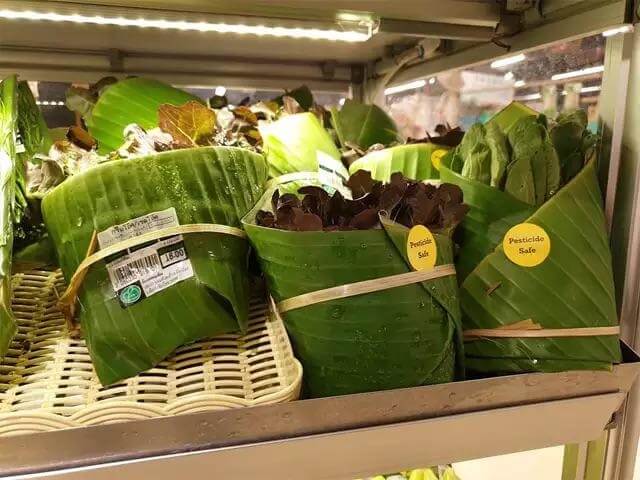A shopper in Thailand took to a subreddit "for the most interesting things on the internet" to showcase a literal green packaging practice, earning the supermarket employing it praise for the innovative method.
What happened?
"Thailand supermarket uses banana leaves instead of plastic packaging," the headline stated above a photo of lettuce neatly wrapped in banana leaves that were labeled "pesticide safe."

"That's really cool!" one user commented.
"So they should," another added, "one of the most plastic polluted countries in the world."
"Funny how they only show theses items and not the ones next to them. I live in Thailand and regularly shop at this grocery store. Tomatoes, eggplants and pretty much everything else that is wrapped in banana leaves is also additional wrapped in plastic," a third shared.
Why is the packaging important?
Plastic waste is a growing environmental problem.
In 2016, about 267 tons of plastic waste was produced globally, a figure which has undoubtedly grown. Very little of the material is or can be recycled, and once in the environment, conventional plastics may take hundreds of years to break down.
Furthermore, as plastic breaks down, it creates microplastics — plastic particles less than 5 millimeters long — that have now been found in nearly every part of the world and cause harm to wildlife and humans.
Park rangers in Thailand recently discovered plastic in the stomach of a dead deer found in a protected forest, and The Guardian reported that toxins from plastic packaging make their way into the food we eat.
What can other companies learn from this?
With growing attention being paid to the waste created from packaging by major companies such as Amazon, Green Chef, and grocery stores across the globe, a positive example is a breath of fresh air.
While commenters pointed out Thailand's prevalent plastic problem and the fact that this plastic-avoidant practice is less than prevalent, given the amount of plastic pollution in the world, any and all examples that show otherwise matter.
"I wonder which plants in the US could be used this way?" one commenter asked. "Bananas don't grow in my region (I don't even know if they grow here at all), but it would be nice to find some local alternative."
While the store in the post was never mentioned by name, indeed it deserves praise. Other companies can learn by example, seeing that there are alternatives to plastic packaging and looking to make similar changes.
What can I do to help limit plastic waste?
As individuals, we can support brands that employ plastic-free packaging and make changes in our daily lives to alter how we buy and use plastic.
Join our free newsletter for cool news and actionable info that makes it easy to help yourself while helping the planet.









